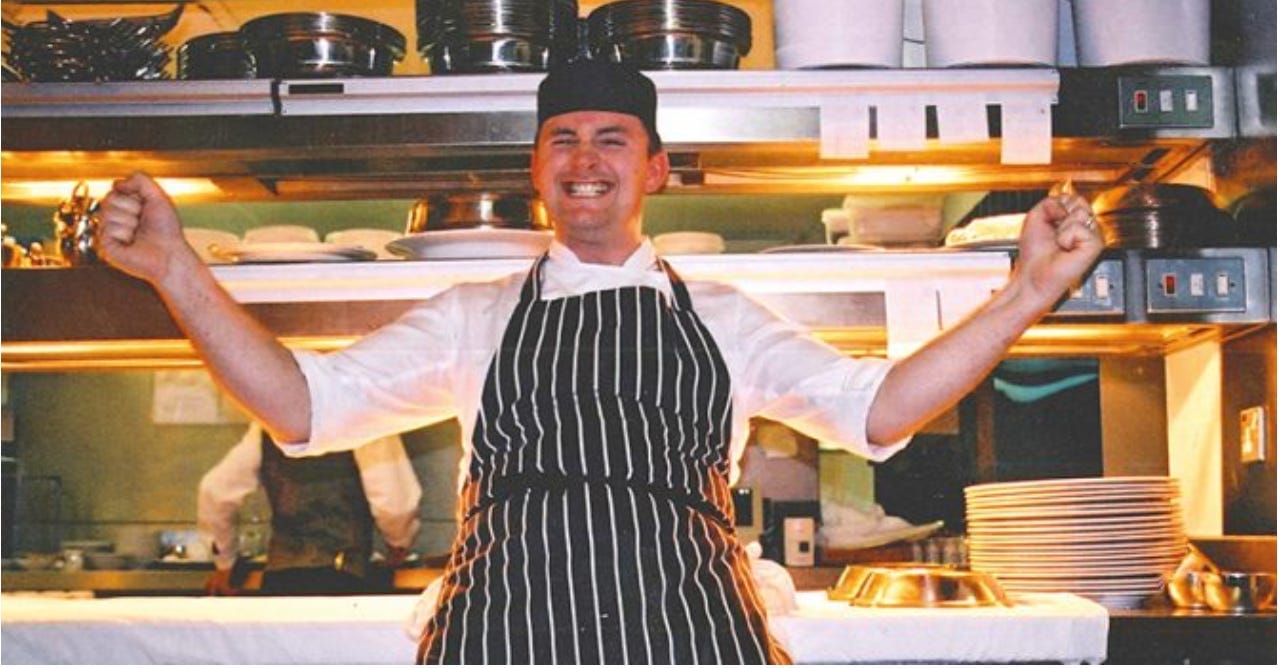"Medway is the most amazing and the most frustrating place"
What Steven asked Simon Cook, Chair of Medway Place Board.

For the second in our new weekly Sunday interview feature, Steven sat down with Simon Cook, Chair of the Medway Place Board. Simon is a former Michelin Star chef who worked in restaurants in Germany and South Africa before retraining as a teacher, quickly entering leadership roles in further education, and rising to the role of principal. Steven met with Simon in his office, where they discussed the challenging dualities of Medway and what needs to be done to help young people and Medway as a place move forward.

Where were you born?
I was born in Ipswich in Suffolk, not a million miles away from where we are in Medway as far as the crow flies.
What jobs did your parents do growing up?
My father started off his career as an apprentice compositor, working for newspapers, so he would be the person that would compose the pages that we would see in our newspapers and the print together before went off. My mum did various different jobs. Her full-time profession was obviously a housewife, looking after us, but also worked part-time just to bring in extra money. She worked as a school cook, she worked in a factory that made hams and sausages and pies and things like that. Then my dad had to retrain later. He was subject to all of the technological advances in print media which meant that they no longer needed people to put the pages together. So he retrained as a journalist. As a teenager growing up with a dad who was a journalist and a learning journalist, it was a nightmare because everything was about ‘What are you doing?’, ‘Where were you?’, ‘What's going on?’ So that wasn't too much fun, to be honest.
How did you find school and university?
I hated school with a passion. I talk about this a lot to staff because I say that it's ironic with the job I have as Principal Chief Executive of a further education college. But if I hadn't disliked school, I wouldn't know why I do the job that I do now. One of the reasons I didn't like school was I just didn't know why I was there really. Yes, you know you have to go to school but it's this classic thing that every young person wants to know is why. ‘Why do I have to go to school?’ ‘Well, you do’ was the answer I would always get.
I remember maths lessons. I remember sitting in the lesson, we've gone through countless repetitions of trigonometry and Pythagoras’ theory and I just said to her ‘Why am I doing this?’ and the only answer I would get would be ‘You’ve got to do it for your GCSE exams.’ If you told me how to write a cheque or open a bank account, I know why I'm going to use that, but why am I going to use Pythagoras’ theory and she would only say could you got to understand it for a GCSE exam. So because I never got the answer to why I just didn't like school.
I knew by default I had to leave school at 16, the minute I was able to no longer be at school. As a result of that, the only thing at school I was interested in was cooking. I always enjoyed cooking and so it was the only thing I really like doing at school so by default that was my careers advice. Not the online questionnaire of careers advice which told me I needed to be a deep sea diver, but because I only enjoyed cooking I thought I'd do a career in cooking afterwards so I was supposed to go to college full time as a student studying catering. But in the summer a friend of a friend of somebody my dad worked with, who knew a hotel manager about 10 miles away from where I grew up said they've got a job going. I started a three-year apprenticeship then, so that was my starting point really before I even experienced university later on in life.
What was your first full-time job?
It was my apprenticeship really, my first ever full-time job and I loved it. I remember my first pay packet. This gives my age away, but in the brown envelope that you had to go to a particular office to collect every week was the slip of paper that had all the deductions and everything on it and my pay £55 a week. I was loaded, minted on 55 quid a week. My first full-time job and the cash was stuffed in the envelope until I think it was probably about six months later then things got into bank accounts and transfers and I had to open up my first ever bank account to put that cash into. It was great because it felt like independence or, more importantly from my experience at the school, felt like I could do something that made a difference and was enjoyable. So I did that for three years finished my apprenticeship and then was lucky enough to be able to get a job in London working in five star luxury hotels.
What makes somebody a great chef?
Oh! (pauses) Energy, passion, enthusiasm, a willingness to know that you have to keep pushing really hard and working really hard with very little reward. One day that reward might only be small but it will make everything else worth it. Something I've realised later on in life is that you should never give up on pursuing perfection, but perfection doesn't exist. There's always somebody that's doing something better than you so you can learn from everybody.
How accurate was the film Ratatouille in depicting a working kitchen?
I’ve never watched it. I should because it’s a cartoon, and that would be right down my street, but I’ve never watched it, so I can’t comment. I’m going to have to watch Ratatouille now.

What brought you to the Medway towns?
A little bit of luck and fortune, but also some determination. So prior to arriving in Medway, my career had taken me to working in Cornwall. I mentioned earlier my first full-time job was cooking. I had at a later point decided that as a result of meeting my now wife, who didn't want to have the sort of lifestyle that was the case in the hospitality industry which is super unsociable hours, I looked at the opportunity of retraining and becoming a teacher because that sounded good. That was only in 2002. I started as a full-time teacher, loved it and was lucky enough to develop my career as a teacher into a manager.
My job before the Medway towns was as a fairly senior manager in the Cornwall College group, which was a bit weird because I'd ended up in the south west as far as you could before you ended up in the Atlantic or in America, so there was nowhere further to go. Cornwall was, at the time, the 4th largest College in the country. It was very big and diverse and I wanted to try out and see what working in large colleges was like. Whilst it was great and I loved it, it was just too far away from the rest of the world. So I wanted to secure the next job in my career which was going to be a Vice Principle type job and knew that I didn't want to go into a big city. Also, the choice was about my wife being able to live somewhere that she was comfortable with. So it definitely wasn't a big city and it definitely wasn't anywhere north of Birmingham. That was the criteria. There were a number of different jobs that came up. One of them was here, I came and I really loved it and it felt really good. I was interviewed and I got offered the job and so that was it really.
What is a tougher experience, working towards a Michelin Star or an Ofsted inspection?
They're both the same actually. They're both very similar. However, there are a set of published criteria that are supposed to help you understand what criteria Ofsted may use in forming a judgement. Whereas there are no published criteria that tell you how and what criteria would be judged against to get a Michelin Star. So, a Michelin Star is more mysterious. Perhaps that is the difference between the two.
How did you come to be the Chair of the Medway Place Board?
The simple answer to that is that I really, really, care about what's going on in Medway. There is a huge opportunity in Medway and I think through my day job, seeing young people who grow up thinking because of their postcode and what their family, if they do have families, experiences are, that their belief is this as good as it's going to get. So often as adults, we look at things through our lens and forget that sometimes suppresses the aspirations that our young people might have.




